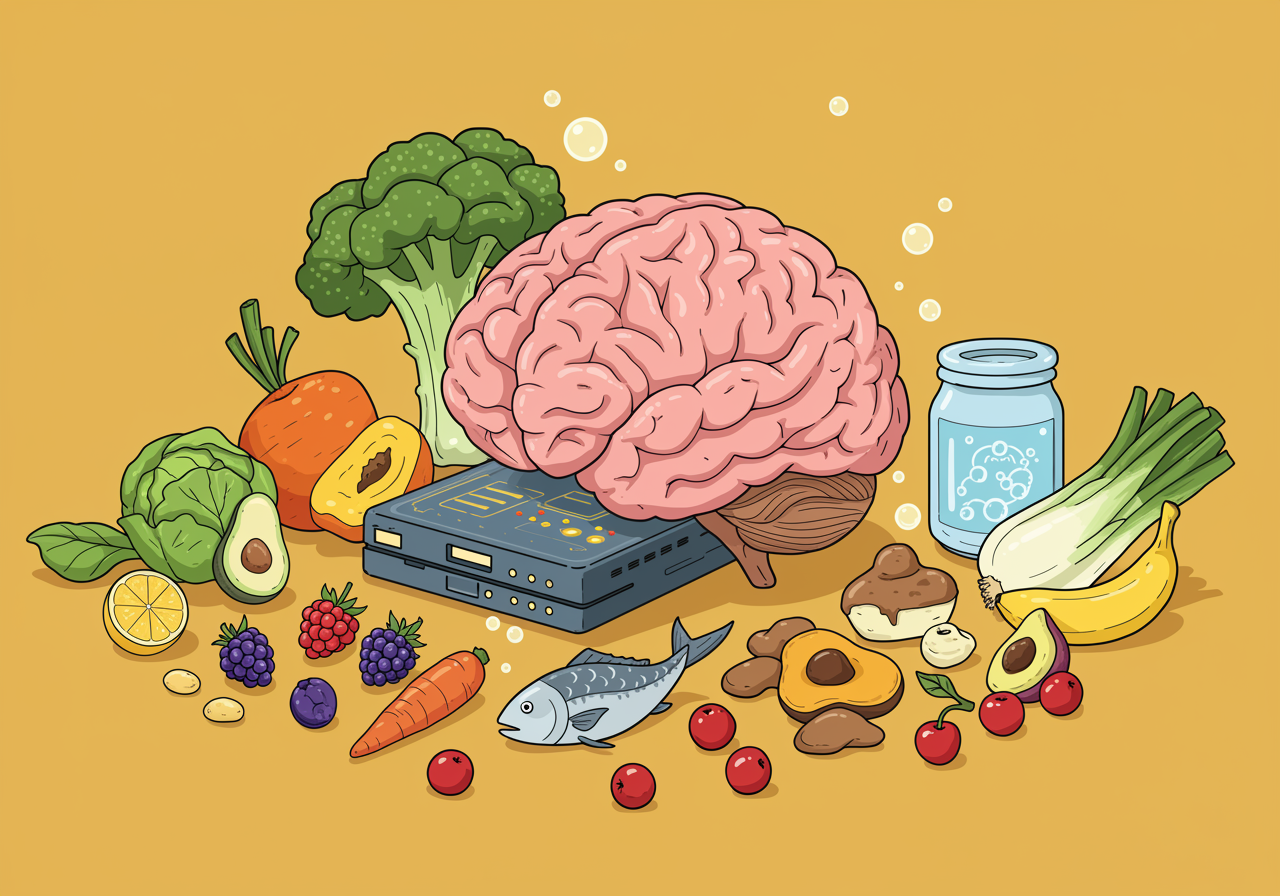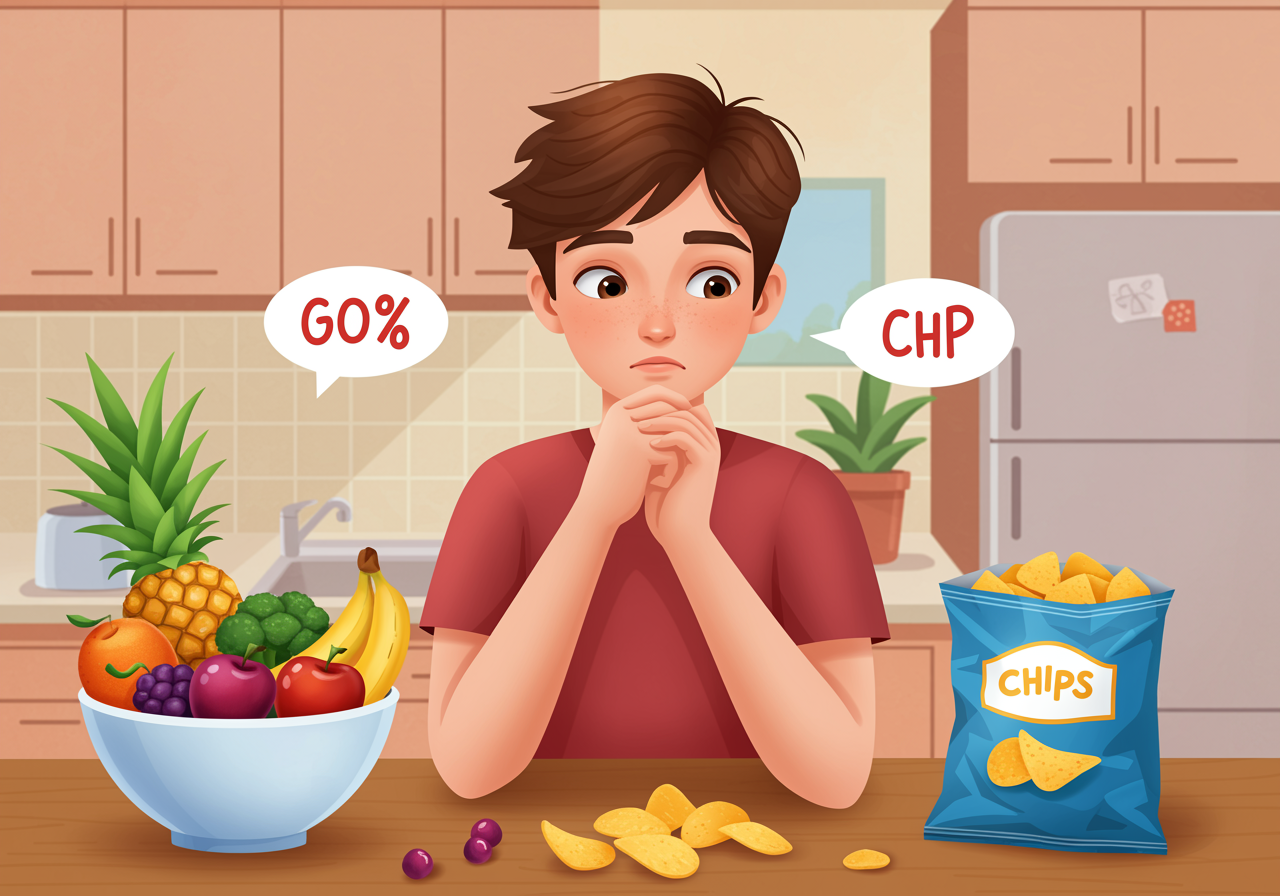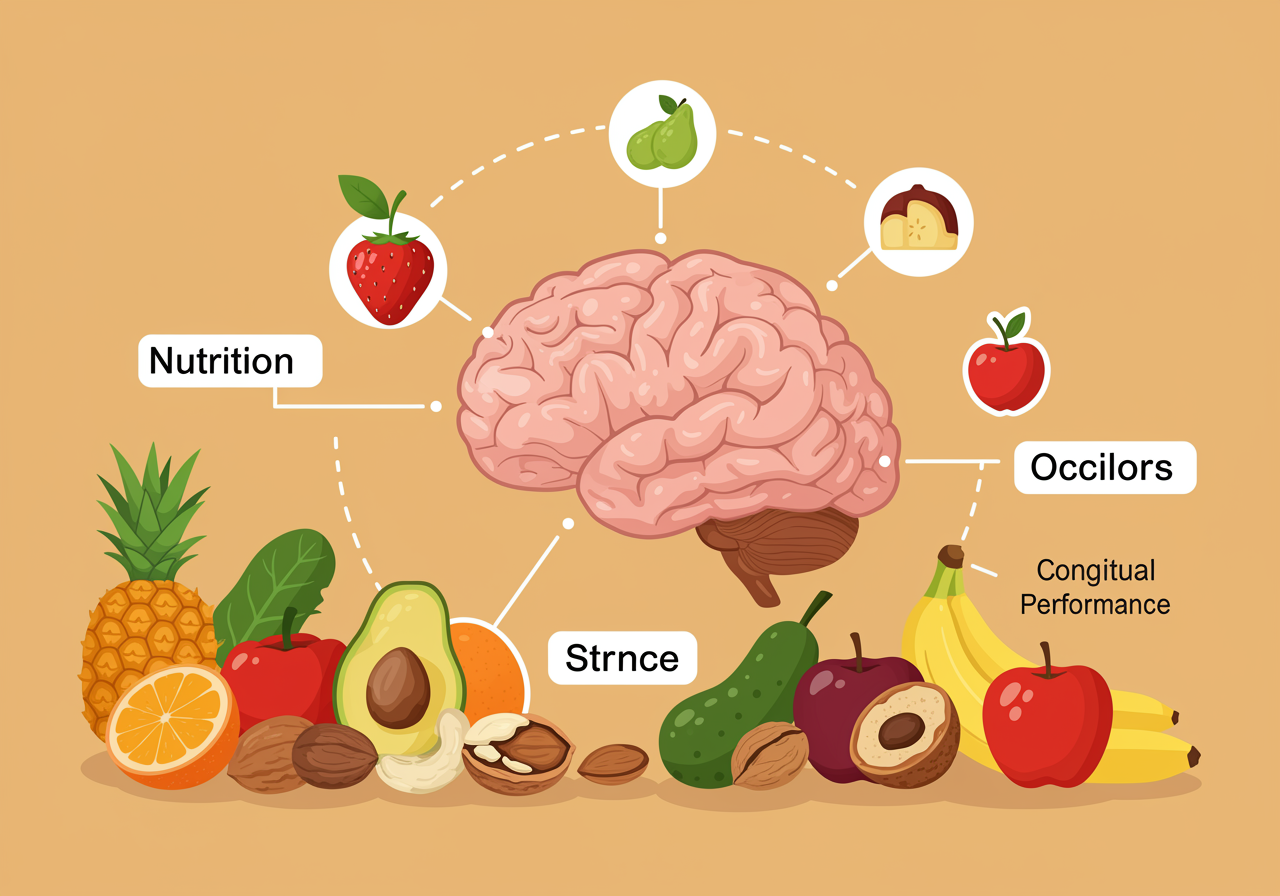Your Brain’s Fuel Tank: How Food Powers Your Mind for Life

Discover how today’s snacks and meals are secretly shaping tomorrow’s memory and thinking power
Ever wonder if that bag of chips or blueberry smoothie could actually change how well your brain works years from now?
Overview
Think about it: your brain is basically the ultimate supercomputer, running 24/7 without ever shutting down. Just like your phone needs the right charger and your car needs good gas, your brain needs the right fuel to keep working at its best. The amazing thing is that what you eat today doesn't just affect how you feel right now – it's actually helping to build the brain you'll have in 10, 20, or even 50 years! Understanding this connection helps families make food choices that support both immediate performance and long-term brain health.

Understand in 30 Seconds
Get up to speed quickly
- Your Brain Eats Too: Your brain uses about 20% of all the energy from your food, even though it's only 2% of your body weight. What you feed it matters!
- Memory Building Blocks: Certain nutrients help build stronger connections between brain cells, which makes memories stick better and thinking faster.
- The Long Game: Eating patterns over months and years can actually change your brain's structure and protect against memory problems later in life.
- It's Never Too Late: Your teenage brain is still growing and changing, so good nutrition choices now can have extra-powerful effects on your future thinking power.
Real Life Scenario
Situations you can relate to
Imagine your brain is like your favorite gaming device. When you first get it, it runs perfectly – fast loading, smooth graphics, no lag. But what if you only charged it with low-quality power sources and never updated the software? Over time, it might start glitching, running slower, or even losing saved games. Your brain works similarly! When you consistently fuel it with nutrient-rich foods like fish, berries, nuts, and vegetables, you're basically giving it premium fuel and regular updates. But a diet heavy in processed foods and sugar is like using a cheap, unreliable charger – it might work for now, but over time, your brain's 'hardware' might not perform as well. The cool part? Unlike your gaming device, your brain can actually repair and improve itself when you give it the right fuel. Have you ever noticed how you feel more focused after eating certain foods versus others?

Role Play
Spark a conversation with “what if” scenarios
What if you could peek into your brain 20 years from now?
- Role play: Take turns being a 'future brain tour guide' and describe two different brains – one that was fed mostly junk food and one that got lots of brain-healthy nutrients. Make it funny by describing the 'rusty memory files' versus the 'lightning-fast thought highways.'
What if you were a scientist studying the connection between food and brain power?
- Role play: Design an imaginary experiment together. One person plays the researcher and the other plays different test subjects. Act out how someone might perform on memory tests after eating different types of meals over several weeks.
What if you had to convince your friends that food affects their gaming or sports performance?
- Role play: Practice explaining the brain-food connection in a way that would make your friends want to try eating better. Use comparisons to things teens care about like athletic performance, test-taking, or reaction time in games.
FAQs
Frequently asked questions people want to know
Does this mean I can never eat junk food again?
Not at all! It's about balance and patterns over time. Occasional treats won't hurt your brain, but the overall quality of your eating habits over months and years is what makes the difference.
How quickly can I see changes in my brain from eating better?
Some effects, like better focus and mood, can happen within days or weeks. But the big structural changes that protect your memory long-term happen gradually over months and years.
Are there specific 'brain foods' I should eat every day?
Foods rich in omega-3s (like fish and walnuts), antioxidants (like berries and dark leafy greens), and healthy fats support brain health. But variety is key – no single food is magic!
Examples in the Wild
See how this works day to day
- A 2023 study found that teenagers who ate more fruits and vegetables had better attention and memory test scores compared to those eating more processed foods. (American Journal of Clinical Nutrition)
- Research shows that people who follow a Mediterranean-style diet (lots of fish, olive oil, and vegetables) have a 35% lower risk of cognitive decline as they age. (Mayo Clinic Studies)
- Professional esports players and gamers are increasingly working with nutritionists to optimize their diets for better reaction times and sustained focus during competitions. (Sports Nutrition Research Institute)
- Schools that improved their lunch programs with more whole foods and less processed options saw improvements in students' test scores and classroom behavior. (Journal of School Health)
In Summary
What you should know before you start
- Your brain is constantly rebuilding itself using the nutrients from your food as building materials
- Eating patterns over time can strengthen or weaken the connections that control memory and thinking
- The teenage years are a special window when good nutrition can have extra-powerful effects on brain development
- Small, consistent changes in food choices can add up to big differences in long-term brain health and cognitive performance
Pro-tip for Parents
You got this!
If your teen seems resistant to changing their eating habits, focus on addition rather than restriction. Instead of saying 'no more junk food,' try 'let's add one brain-boosting food to each meal this week.' Connect food choices to things they care about – like performing better in sports, having more energy for friends, or improving focus for gaming. Remember, you're modeling long-term thinking skills, not just teaching nutrition.

Keep an Eye Out For
Find these examples in everyday life
- News stories about athletes or celebrities talking about how nutrition affects their mental performance
- Research studies linking specific foods to brain health that might make headlines
- Opportunities to cook together and discuss how different ingredients might benefit the brain
Explore Beyond
Look up these related research topics
- How sleep quality affects memory formation and brain health
- The connection between physical exercise and cognitive performance
- How stress and emotions impact learning and memory